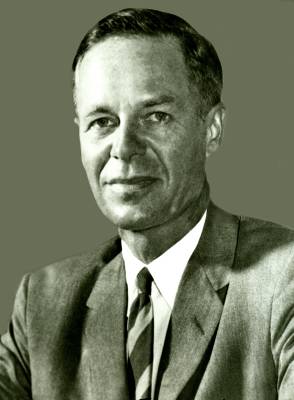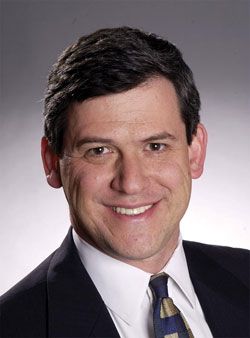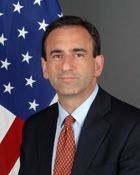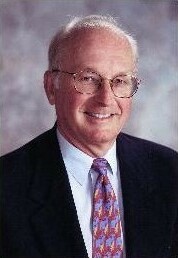Related Research Articles

The Council on Foreign Relations (CFR) is an American think tank specializing in U.S. foreign policy and international relations. Founded in 1921, it is an independent and nonpartisan nonprofit organization. CFR is based in New York City, with an additional office in Washington, DC. Its membership has included senior politicians, numerous secretaries of state, CIA directors, bankers, lawyers, professors, corporate directors and CEOs, and senior media figures.

Charles Woodruff Yost was a career U.S. Ambassador who was assigned as his country's representative to the United Nations from 1969 to 1971.

Daniel Benjamin is an American diplomat and journalist and was the Coordinator for Counterterrorism at the United States Department of State from 2009 to 2012, appointed by Secretary Hillary Clinton. Benjamin was the director of the John Sloan Dickey Center for International Understanding at Dartmouth College. In July 2020, he became president of the American Academy in Berlin, a nonprofit, nonpartisan, independent transatlantic institution in the German capital.

The School of International and Public Affairs (SIPA) is the international affairs and public policy school of Columbia University, a private Ivy League university located in Morningside Heights, Manhattan, New York City. It is consistently ranked one of the leading graduate schools for international relations in the world. SIPA offers Master of International Affairs (MIA) and Master of Public Administration (MPA) degrees in a range of fields, as well as the Executive MPA and Ph.D. program in Sustainable Development.

Martin Sean Indyk is an American diplomat and foreign relations analyst with expertise in the Middle East. He was a distinguished fellow in International Diplomacy and later executive vice president at the Brookings Institution in Washington, D.C from 2001-2018. He took leave from the Brookings Institution to serve as the U.S. Special Envoy for Israeli–Palestinian Negotiations from 2013 to 2014. He is currently a distinguished fellow at the Council on Foreign Relations.

The Middle East Institute (MEI) is a non-profit, non-partisan think tank and cultural centre in Washington, D.C., founded in 1946. It seeks to "increase knowledge of the Middle East among the United States citizens and promote a better understanding between the people of these two areas."
William Roe Polk was an American foreign policy consultant and author. He was a professor of history at Harvard University and the University of Chicago, and was President of the latter's Adlai Stevenson Institute of International Affairs.

Geoffrey Kemp is a British-American academic and writer on international relations. He is the Director of Regional Strategic Programs at the Center for the National Interest, and has held posts in academia and in the U.S. Government.
Joseph Albert Kéchichian is a political scientist.

Gideon Rose is a former editor of Foreign Affairs and a member of the Council on Foreign Relations. He served as associate director for Near East and South Asian Affairs on the staff of the National Security Council from 1994 to 1995 under the Clinton Administration.

Bruce O. Riedel is an American expert on U.S. security, South Asia, and counter-terrorism. He is currently a senior fellow in the Saban Center for Middle East Policy at the Brookings Institution, and a professor at Johns Hopkins School of Advanced International Studies. He also serves as a senior adviser at Albright Stonebridge Group.
Robert Edwards Hunter is an American government employee and foreign policy expert who served as United States ambassador to NATO during the Clinton administration.

Daniel Benjamin "Dan" Shapiro is an American diplomat who served as United States Ambassador to Israel from 2011 to 2017. He was nominated by President Barack Obama on March 29, 2011, and confirmed by the Senate on May 29. He was sworn in as ambassador by Secretary of State Hillary Clinton on July 8, 2011. Previously, he was the senior director for the Middle East and North Africa on the United States National Security Council. As an Obama administration political appointee, Shapiro was ordered on January 5, 2017, to resign upon the inauguration of President Donald Trump. On August 30, 2021, President Joe Biden appointed Shapiro as a special liaison to Israel on Iran.
Mohamad Bazzi is a Lebanese-American journalist. He is the former Middle East bureau chief at Newsday and a current faculty member of New York University. He is currently director of the Hagop Kevorkian Center for Near Eastern Studies at New York University. Bazzi was the 2007–2008 Edward R. Murrow Press Fellow at the Council on Foreign Relations. From 2009 to 2013, he served as an adjunct senior fellow for Middle East Studies at the Council on Foreign Relations.

Bruce R. Hoffman is an American political analyst. He specializes in the study of terrorism, counter-terrorism, insurgency, and counter-insurgency. Hoffman serves as the Shelby Cullom and Kathryn W. Davis Senior Fellow for Counterterrorism and Homeland Security on the Council on Foreign Relations, and is a professor at the School of Foreign Service of Georgetown University, where he directs its Center for Jewish Civilization. In addition, he is the Professor Emeritus and Honorary Professor of Terrorism Studies at the University of St Andrews, and is the George H. Gilmore Senior Fellow at the U.S. Military Academy's Combating Terrorism Center.

Philip H. Gordon is an American diplomat and foreign policy professional. Since March 21, 2022, he has served as Assistant to the President and National Security Advisor to the Vice President of the United States, Kamala Harris. Earlier in his career, he was Assistant Secretary of State for European and Eurasian Affairs (2009–2011) and Special Assistant to the President and White House Coordinator for the Middle East, North Africa, and the Persian Gulf Region (2013–2015) during the presidency of Barack Obama.

William B. Quandt is an American scholar, author, and professor emeritus in the Department of Politics at the University of Virginia. He previously served as senior fellow in the Foreign Policy Studies Program at the Brookings Institution and as a member on the National Security Council in the Richard Nixon and Jimmy Carter administrations. He was actively involved in the negotiations that led to the Camp David Accords and the Egypt–Israel peace treaty. His areas of expertise include Algeria, Egypt, Israel, Palestine, the Israeli–Palestinian peace process, and U.S. foreign policy.
Steven A. Cook is the Eni Enrico Mattei senior fellow for Middle East and Africa studies at the Council on Foreign Relations (CFR). He is the author of False Dawn: Protest, Democracy, and Violence in the New Middle East. He is also the author of The Struggle for Egypt: From Nasser to Tahrir Square and Ruling But Not Governing: The Military and Political Development in Egypt, Algeria, and Turkey. Cook contributes regularly to foreign policy journals such as Foreign Affairs, Foreign Policy, The Atlantic, and The New Republic. He also runs a blog about Middle Eastern politics and history.
Daniel L. Byman is a professor at Georgetown University's Walsh School of Foreign Service. He is a senior fellow with the Transnational Threats Project at the Center for Strategic and International Studies where he conducts research on terrorism, Iran, and other Middle East security issues. He is also a member of the International Security Advisory Board at the U.S. Department of State.

Jerrold D. Green is the president and chief executive officer of the Pacific Council on International Policy in Los Angeles, California. He is concurrently a research professor at the University of Southern California Annenberg School for Communication and Journalism.
References
- ↑ "New US Mideast director takes the helm a... JPost - National News". Archived from the original on 2012-08-12. Retrieved 2011-12-06.
- ↑ "Steven Simon | IISS". www.iiss.org. Archived from the original on August 12, 2013.
- ↑ Robert Ford and Steven Simon Joining MEI as Senior Fellows MEI, April 23, 2014. Retrieved May 5, 2014.
- ↑ "Terrorism and Middle East Expert Steven Simon Joins the Council to Study American-Muslim Relations". Council on Foreign Relations. Retrieved 2020-07-28.
- ↑ Yumpu.com. "Download this issue as a PDF - Columbia College - Columbia ..." yumpu.com. Retrieved 2021-06-25.
- ↑ Monica, 1776 Main Street Santa; California 90401-3208. "About the RAND Corporation". www.rand.org. Retrieved 2020-07-28.
- ↑ "Steven Simon" (PDF). Retrieved 28 July 2020.
- ↑ "Steven Simon". American Academy. Retrieved 2020-07-28.